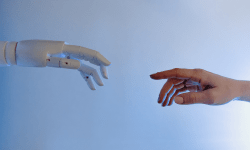Dear Doc:
As I understand it, one of the disputes during the recent SAG-AFTRA actors’ strike was over the use of artificial intelligence-generated actors instead of actual humans in movies and other performances. I think that there ought to be a law against that kind of thing!
Signed,
George Karlin
Dear George:
You may just get your wish! A proposed bill in Congress seeks to regulate the creation and use of AI-created replicas of actual people. Because these days every bill simply must have a cutesy acronym, the draft bill is called the “Nurture Originals, Foster Art, and Keep Entertainment Safe Act,” (“NOFAKES Act”). It is being cosponsored by Senators Chris Coons (D-DE), Marsha Blackburn (R-TN), Amy Klobuchar (D-MN), and Thom Tillis (R-NC).
The sponsors say that they are responding to concerns about the risk of AI creating images of real people (alive or dead) that portray them doing and saying things they wouldn’t agree to, and/or failing to compensate them for unauthorized uses of their features. This would be the first federal law establishing a “right of publicity.”
Under U.S. state laws, the right of publicity protects against the unauthorized commercial use of an individual’s name, likeness, or other recognizable aspects of one’s persona. It gives an individual the exclusive right to license the use of their identity for commercial purposes. The right of publicity is protected by state common or statutory law and only about half the states have this law.
As defined in the proposed federal act, the term “digital replica” means a newly-created, computer-generated, electronic representation of the image, voice, or visual likeness of an individual that (a) is [nearly indistinguishable] from the actual image, voice, or visual likeness of that individual; and (b) is fixed in a sound recording or audiovisual work in which that individual did not actually perform or appear. Of course, anyone would have the right to authorize the use of their image, voice, or visual likeness in a digital replica if they wish to do so. In the case of someone who is dead, the right would pass to the heirs, and this right would be considered a personal property right. The right would last for seventy years after the death of the individual portrayed. This is like copyright, which protects works for the life of the author plus 70 years. After expiration, the persona enters the public domain (so watch out for fake Albert Einstein’s popping up everywhere!).
Enforcement against violators is by way of civil lawsuits, and damages would be the greater of $5000 per violation or the damages actually suffered by the injured party. If the defendant acted with malice, fraud, or oppression, the court could also award punitive damages.
Interestingly, the proposed law also has a form of “fair use” exception that provides:
It shall not be a violation of paragraph (1) if, regardless of the degree of [dramatization]—(A) the applicable digital replica is used as part of a news, public affairs, or sports broadcast or report; (B) the applicable digital replica— (i) is used part of a documentary, docudrama, or historical or biographical work; and (ii) uses a representation of the applicable individual as that individual; (C) the applicable digital replica is used for purposes of comment, criticism, scholarship, satire, or parody; (D) the applicable digital replica is used in an advertisement or commercial announcement for a purpose described in subparagraph (A), (B), or (C); or (E) the use of the applicable digital replica is de minimis or incidental.
The NOFAKES Act was introduced in Congress on October 12, 2023. There will, of course, be hearings and testimony from interested parties, including the movie studios, the actors’ union, AI companies, law professors, etc., etc., etc. before the Act is finally put to a vote (if that ever happens). In related news, a number of bills have been introduced that seek to label and/or limit the use of AI in political advertising. It is, however, unlikely that these bills will become law before our next election in November 2024.
If you’ve been duplicated by AI or have any other cutting-edge intellectual property questions, give the attorneys at LW&H a shout. Every one of them is a genuine human and knows lots about this area of the law.
Until next month,
The “Doc”
— Lawrence Husick, Esq.



